Stephen Roney's Blog, page 279
November 7, 2019
New Podcast
Starting a new podcast based on the book, Playing the Indian Card.
Sign up and subscribe!

'Od's Blog: Catholic and Clear Grit comments on the passing parade.
Published on November 07, 2019 14:33
The Guns of August
On the theme of Remembrance Day, Barbara Tuchman's The Guns of August is perhaps the finest history book ever written, in terms of prose style.
I recommend it for a sense of the opening moves of the Great War.

'Od's Blog: Catholic and Clear Grit comments on the passing parade.
Published on November 07, 2019 09:11
Conspiracy Theory and Practice
 Francis Dashwood, a leader of the Hellfire Club, by Hogarth.
Francis Dashwood, a leader of the Hellfire Club, by Hogarth.I hate to comment on the Jeffrey Epstein case, because anything about it is a conspiracy theory. Conspiracies are inherently rare, and it is easy to go off quarter-cocked.
But sometimes conspiracies are real. There really was a Bavarian Illuminati. There really was a Hellfire Club.
There is an alternate danger, too. That, faced with evidence of evil, we avert our eyes and walk away. It is the more comfortable thing to do. And Edmund Burke’s advice still holds: “All that is necessary for evil to triumph is for good men to do nothing.”
It is pretty definite that Epstein was murdered. The known circumstances put the claim of suicide beyond reasonable belief. We now also have the public testimony of a highly respected coroner who was at the autopsy; although couched in typical legal-medicalese. The results were “consistent” with homicide. They were not “consistent” with suicide.
And the murder of Epstein requires a conspiracy.
Moreover, the official autopsy report did not say homicide, and, according to the coroner who has now come forward, failed to include obvious things like a test for DNA. That too seems to require a conspiracy.
Now Project Veritas has come out with a “hot mic” video of an ABC news anchor lamenting that she had all the goods on Epstein and his Fantasy Island three years ago, and the story was spiked by the network. Fear of litigation by powerful people might explain it; but such fears did not stop the networks from reporting quite wild allegations against Brett Kavanaugh or Donald Trump, without much or any corroboration.
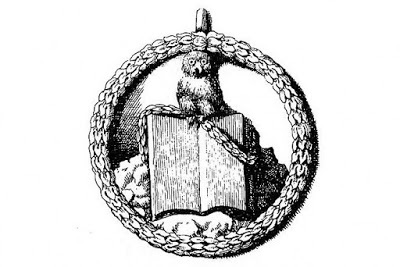 Owl of Minerva, crest of the Bavarian Illuminati
Owl of Minerva, crest of the Bavarian IlluminatiThree years ago—that would mean the story was spiked during the last presidential election, more or less. Might have been relevant. Again begins to look conspiratorial.
But then, we already know that the mainstream media is involved in a political conspiracy. That cover was blown years ago, by “Journolist.”
All of this in turn tends to prove the basic truth of the wild allegations regarding what was going on with Epstein’s pedophile ring. There obviously must be some very powerful people who risk some very grave consequences if the full truth comes out. Powerful enough to reach in and control the US Prison Service, ABC, or the NY coroner’s office, as needed. Consequences grave enough to prompt them to murder almost openly—to take such a risk.
Now we must also worry—is it possible to ever get this properly investigated? We no longer know who’s in on the fix, and who is clean. It seems to me too there are other troubling matters in recent years that have been more or less ignored—the matter of Hillary Clinton’s emails, for example. I find it hard to believe that mere incompetence can account for it. More likely, Clinton was deliberately feeding information to some foreign power. The matter of Hunter Biden, China, and the Ukraine looks pretty outrageous, now that Trump has raised it—yet the damning basic facts have been in public view for years. And when Trump calls for an investigation, the Democrats act as though he has done something wrong, not Biden. Then there are longstanding unanswered questions about Juanita Broderick’s rape charges and the “Clinton death list.”
Perhaps sordid things have been going on among the upper crust at all times. Perhaps what is different now is that we have the democratization of information flow thanks to the Internet. No doubt that is at least partly true. On the other hand, the democratization of information has recently been very drastically throttled in again by Silicon Valley overlords.
These sorts of revelations may explain why.
The malfeasance does seem to fall heavily on the left side of the political spectrum. I don’t think I am being partisan here; it’s pretty obvious. If there is the slightest charge, moreover, against a Republican, it is more than thoroughly aired.
This moral imbalance between the sides seems to me to stand to reason: it is the left that has embraced “moral relativism” and postmodernism, in which you get to say or do whatever you decide is in your interest, regardless of truth or morals. Leaving aside Trump, who is at best hard to read, many leading Republicans do tend to at least publicly commit to moral traditions: Pence, Romney, Ryan, Cruz, Huckabee, Perry, Jindal, and so on.
Or, in Canada, Scheer.
'Od's Blog: Catholic and Clear Grit comments on the passing parade.
Published on November 07, 2019 06:58
November 6, 2019
Smile or Die
 "Mother told me to always smile."
"Mother told me to always smile."You often hear the advice that you ought to have a positive attitude.
Advice to face the world with optimism is often, in small matters, no doubt good advice. We should meet anyone new with a smile, assuming their good intentions. To do otherwise is prejudice. But that is not the whole truth. Ronald Reagan used to say, “trust, but verify.” Former US Defense Secretary Mattis went further. “Be polite, be professional, but have a plan to kill everybody that you meet.”
This “positive attitude” business easily segues into the current postmodern idea that truth is subjective: talk of “narratives” and “my truth,” and the idea that you can create your own reality.
It goes further back than that, of course—“the power of positive thinking,” beloved by so many salesmen. “Think and grow rich.”
But being unrealistically optimistic is as harmful as being unrealistically pessimistic. The goal should not be optimism or pessimism, but realism.
An example from modern history: the Munich Agreement. Chamberlain was the determined optimist, and insisted on assuming good intentions.
Chamberlain’s approach was wildly popular, and Churchill’s was not. Churchill was dismissed as a warmonger.
This suggests that unrealistic optimism may be a more common human problem than unrealistic pessimism. People naturally WANT to be optimistic, and to believe good things will happen. Nobody WANTS to be pessimistic. And so this is the side on which we are more likely to err.
This is why we need to streetproof children, for example. The instinct is to be too trusting.
Other examples of unrealistic optimism leading to disaster can be easily found in history. The story of the Titanic is that same story. The story of Austria-Hungary starting the First World War by invading Serbia. The story of Japan bombing Pearl Harbor. Both were obviously over-optimistic about their own abilities. So was Germany in invading the USSR in WWII. Or Napoleon in invading Russia the previous century. So was the US in going in to Vietnam, or Afghanistan, or Iraq. Probably every economic collapse ever has been caused by a preceding period of unreasonable investor optimism.
Canadian history? Laurier promised to solve the Manitoba Schools question with “sunny ways.” Everybody bought it at the time. The actual result: no more French or Catholic schools in Manitoba.

Unrealistic optimism is a recurring theme in the Old Testament: a prophet appears and warns of disaster to come, unless the government’s direction changes. And he is ignored as an annoying pessimist. And disaster comes. You’d think we’d been told this often enough to have learned the lesson.
The same theme is in the Greek: Cassandra and Laocoon in the Iliad. Nobody wants to hear anything upsetting.
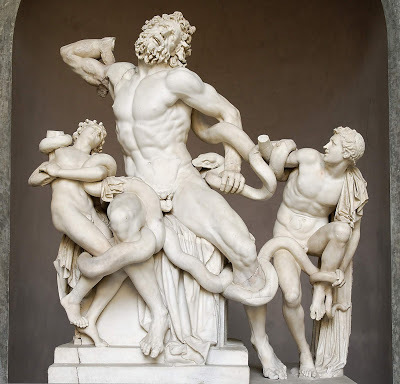
Unrealistic optimism would seem to be the greater human danger, not unrealistic pessimism. But the real danger is unrealism. Realism is the proper goal.
The notion that we can critically affect by our own attitude whether good or bad befalls us, also has the awful side effect of ending up in blaming the sufferer or victim whenever someone does encounter trouble. It must be their own fault; they had the wrong attitude. If a woman is raped, she must by her attitude have deserved it. And the Jews must have provoked Hitler somehow.
Pushed a little, believing that we can control our own destinies with the right attitude also amounts to assuming godlike powers.
Which is close to Eve’s fatal error—“you will become as Gods.” Or Lucifer’s.
I say not “smile,” but “pay attention.” Look, listen, discern, and decide. This, use an often misused Buddhist term, is the true “mindfulness.”
'Od's Blog: Catholic and Clear Grit comments on the passing parade.
Published on November 06, 2019 12:38
November 5, 2019
Bad Times
The Seventies were a grim time. They were a decade of hangover from the Sixties. I gather the Fifties were awful too: soulless scientism and suburban sprawl. And a collapse of sexual morality. Everyone would surely say the same of the Dirty Thirties: mass unemployment and the rise of Fascism.
The twenty-teens seem to me to have emerged as similarly bad.
 The Fifties: artistically kind of sucky.
The Fifties: artistically kind of sucky.I wonder if we are in some regular twenty-year cycle?
The nineties may have been another depressed decade—the Clinton/Blair/Chretien years. I do not have a good fix on it; I mostly sat out the nineties in Asia. But that may be itself an indication: I needed to get out. It was too depressing in the West.
By “bad,” I mean depressed in the spiritual, not the economic, sense. These decades have been times in which North American and European society seemed to have lost their sense of purpose and direction. These were times adrift. Economic depression tends to come with this, but it is the sideshow, not the main event; and, I suspect, not cause but effect. Jimmy Carter sensed it, in the latter seventies, when he spoke of a social “malaise.” Kissinger expressed it when he spoke of himself as a modern Metternich, in the service of a declining empire.
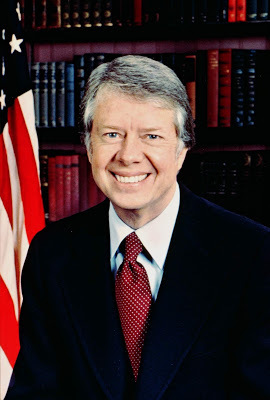 The smiling face of the Seventies.
The smiling face of the Seventies.I suppose, being now in such a time, the useful thing to ponder is what in the past has pulled us out of such torpor. The mention of Jimmy Carter reminds us that, in the 80’s, it seems to have been new leadership. It was the strangely almost-simultaneous appearance of several strong leader figures, each in their way promising a new direction and a new beginning: Reagan, Thatcher, Pope John Paul II, Gorbachev, Deng Xiao Ping.
In the Sixties, it was more an artistic and cultural revival: the “counterculture” promised a new beginning, an Age of Aquarius. Rock/pop music, pop art, the Whole Earth Catalog, zines, and so on and on.
 Suitable for colouring while on acid.
Suitable for colouring while on acid.In the Forties, it was the unity and sense of purpose imposed by the need to take on the monstrous Nazis and their allies. Secondarily, this too led to the appearance of some inspiring leaders: Churchill, De Gaulle, Tito. Note that the major Fascist leaders emerged in the 20s and 30s. They were part of the malaise; they were not inspiring in the proper sense.
After the triangulation and fudgy “Third Way” if the nineties, the oughts restored clarity for a time with the need to respond to 9/11 and the rise of Islamist terror. The seeping of hi-tech into everyday life probably also generated some excitement about the future. That period of relative unity and optimism has now clearly dissipated.
What will pull things back into focus this time? Strong leaders with vision? Thatcher and Reagan, after all, were already visible in the wings in 1979; Churchill was long well-known in the 1930s.
Donald Trump and Boris Johnson, whatever else they represent, do not seem to offer any coherent and inspiring new vision. They are comic figures, only declaring the nonsensical nature of what is. I do not compare them with Hitler or Mussolini, as others do, but they still seem part of the malaise, not of the new morning.
Sanders and his like on the left? Perhaps I am unjustly prejudiced; I thought Reagan too was dangerously wrong with his “voodoo economics” before he rose to power. But apart from their pre-K understanding of economics, I do not think there is anything there, because there is no spiritual element or appeal. With successful revivals, there always is. For it is the spirit that must be moved.
I think Mad Max Bernier here in Canada is one figure who might have this inspirational dimension; but that is not yet clear. The “Mad” label is to his credit in this regard. The appeal would not be conventionally religious: rather to a cultural ideal. I think Tulsi Gabbard has potential in the current Democratic crop. Nobody notices, but her commitment to non-violence is obviously informed by her Hinduism. But such figures are for now on the fringes.
So what about religion as the source of our revival? What about the arts? It was the arts in the 60s. John Paul II may have been the one necessary ingredient to the Eighties revival, and just as possibly, John XXIII and his Vatican II was the critical factor that kicked off the 1960s.
 Pope St. John XXIII
Pope St. John XXIIIThe Catholic Church, sadly, is currently in chaos. This is most troubling, because it is the single strongest religious voice in the world, let alone in the West. But Pope Francis gives no clear leadership.
Is there a figure in the Protestant tradition, or beyond? A Jonathan Edwards, a John Wesley, a Martin Luther King Jr.? Perhaps: I have one eye on William Lane Craig. To hear him tell it, something is percolating in Departments of Theology and Philosophy.
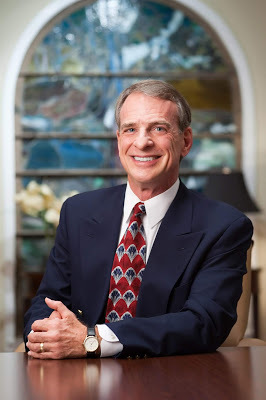 William Lane Craig
William Lane CraigThe arts, too, seem moribund. But there is probably something bubbling under the surface, struggling to break free. The arts are currently, as periodically happens, under the iron grip of “The Academy,” the art critics and academics, which do not understand the arts, and enforce conformity and mediocrity. But when this goes on long enough, there tends to be an eruption. An eruption seems overdue. I expected it in the 20-oughts. I expected it in the eighties.
The stuff in the galleries is obviously garbage. No sense of the beautiful, no sense of symbolism or vision or emotional connection, painfully clichéd and predictable. Decor. Generally making some obvious and tedious political statement.
Yet the stuff in the galleries is not representative of contemporary art. It is just the art that bureaucrats like; for bureaucrats control galleries. I follow a Facebook group of struggling visual artists. These folks in the artistic underground are inspiringly good. With the growth of social media, they are bound to break through soon.
So too with writing. I went last weekend to the Toronto Festival of Authors. It was not what it was when I left Toronto in the early nineties. Then, I could hope to see and hear someone I had actually read and enjoyed: Brian Moore, Ken Kesey, Timothy Findlay. There are no longer such figures. One reads new writing any more, it seems, out of a sense of obligation.
I attended the launch of The Best Canadian Poetry of 2019. Decades ago, I was myself featured in the equivalent volume. It was about as much fun as a trip to the dentist. Several selected poets read their selected works. Each was less a poem than a gimmick: “conceptual art.” And even as gimmicks, painfully predictable. The first poem sounded like a dairy entry by an ordinary person on a perfectly ordinary day. Dull as daily life inevitably is; and that turned out to be the point. The final line was something like “just breathing in and out.” This is anti-art. This is just what art is meant to rescue us from.
The next poem was done as a flow chart. Vaguely interesting the first time I saw it done--back at Expo 67.
The next poem was a reflection on how incongruous it is to be thinking of Virgil in modern Toronto. The only point seemed to be to promote the poet as someone so sophisticated as to have read Virgil.
The poetry was so unpoetical that at one point, when this poet was reading an introduction to his poem, I thought it was the poem.
And the last poem was something intentionally incoherent in which every fifth word or so was replaced by the word “unknown”; sometimes in the plural. This, the poet explained beforehand, was a protest against torture and waterboarding. The target was apparently Donald Rumsfield, and his famous phrase about “known unknowns” and “unknown unknowns.”
Leaving aside the fact that the poet completely missed Rumsfield’s point, which could have been an interesting one to consider, the poem was as obviously stale as a newspaper hot off the presses seventeen years ago.
But then, in despair for the state of poetry, I picked up a copy of the West Coast lit mag Geist , available free at the entrance. And it was solid. Subscribe and read.
It is not that the arts are dead; it is that they are suppressed. Something is liable soon to burst free.
And our sight may again be 2020.
'Od's Blog: Catholic and Clear Grit comments on the passing parade.
Published on November 05, 2019 07:36
November 4, 2019
Public Service Announcement
'Od's Blog: Catholic and Clear Grit comments on the passing parade.
Published on November 04, 2019 14:59
Foreword to "Playing the Indian Card"
'Od's Blog: Catholic and Clear Grit comments on the passing parade.
Published on November 04, 2019 12:55
Knights of the Air

Remembrance Day has always been special for me. It is the one holiday most likely to inspire my sense of my own Canadianness.
I think this book has a lot to do with it. It may have been my favourite non-fiction read as a boy. The stories of Billy Bishop, Bill Barker, Raymond Collishaw, Roy Brown, and the like--real Canadian heroes.
If you happen to know any boys, it would make a great gift this Remembrance Day.
'Od's Blog: Catholic and Clear Grit comments on the passing parade.
Published on November 04, 2019 07:23
Sticking with Scheer
 Some argue he just looks too much like a chipmunk to ever be prime minister.
Some argue he just looks too much like a chipmunk to ever be prime minister.Everyone is now out to get Andrew Scheer. Odd, since he was the most successful of the three big party leaders in the last election. Trudeau lost votes and seats. Singh lost votes and seats. Scheer gained both.
This, however, follows old and honoured Tory tradition. Since at least the dying days of Diefenbaker, they have ever been quick to form a circular firing squad at the hint of adversity.
It did the NDP no good to dump Mulcair after one election loss. It did the Liberals no good to dump Dion after one election loss. It may as well do the Tories no good again; unless perhaps they have some clear idea that a distinctly different sort of leader and leadership is required. A Churchill, say, instead of a Chamberlain. A Trump instead of a Romney or a Jeb Bush.
But I see no trace of this in the public reasons given for Scheer to go. They seem completely wrong, and harmful as advice. Scheer was a smiling face, and certainly tried to come across as a moderate. Yet according to all the pundits, he failed to do better because of his personal social conservative views, and because he was not enough like the Liberals on fighting climate change.
According to the rolling polls, this is wrong. What hurt Scheer most was simply the public prediction that he might win a majority government. That scared many on the left into the Liberal camp as a strategic move.
As to the Conservatives’ relatively weak showing in Ontario, I hear that their “vaunted ground game” did not materialize this time. As a local deputy returning officer on the day, I found it notable that they managed no candidate’s representative at my polling station for the count.
This strongly suggests that the problem was a lack of enthusiasm. The same thing that killed Romney. It was not that the Conservative platform differed too markedly from that of the NDP or Liberals. It was that it did not differ enough, giving ideologically-driven volunteers and voters little reason to come out.
It is often said by Liberals that they lose whenever they run to the right. We saw the same for the NDP in 2015: they veered towards the centre, the Liberals swung over to their left. The Dippers dropped to third, the third-place Liberals surged improbably to power.
People in general value sincerity and principle more than any specific ideology. This is ever more so in these days of democratized information, or, to use the journalistic cliché, “social media.” Witness the witless rise below the undefended border of Bernie Sanders and Alexandria Ocasia-Cortez.
But even going with ideological voting, and a cynical approach based on reading the polls, it makes the best sense for Conservatives to pull right and not left on social issues and climate change. One does not need a majority of the vote to get a majority government in Canada; one needs something approaching 40%. Four parties, the Liberals, NDP, Greens, and BQ, are splitting the vote that supports unregulated abortion, carbon taxes, special rights for transsexuals, laws against “hate speech,” stiffer gun bans, and so forth. Yet polls suggest that roughly half or even more of the electorate do not hold these positions. If any of these became the decisive issue in an election, and the Tories were the only party to vote for if you were on that side, it would actually mean a crushing Tory majority.
But even leave aside all partisan considerations, and consider the health of the Canadian democracy. How good a situation is it when a large portion of the electorate, perhaps even a majority, has no vote—that is, no party to vote for that represents their views? Not great for peace, order, or good government.
That this is so commonly now the case is why we see everywhere else the rise of “populist” parties. We are overdue in Canada—held back, I suspect, because in a way we were the first out of that gate, with Preston Manning’s Reform Party. That led to an unreasonable fear of “splitting the vote on the right.” So we have lapsed right back into the untenable situation that then forced Reform to form: the way, under Mulroney, there was nothing to choose between Tories and Grits, and no one to vote for if you were not keen on Charlottetown or Meech Lake and a new, unamendable, constitution.
If there is a problem with Scheer, it is that he is not forceful enough, fiery enough, in his public persona, to make a populist case. He radiates business as usual. The problem with his view on abortion in the TVA debate was not that he was opposed to abortion, but that he tried to fudge it and be on both sides of the issue. Same with climate change.
But suppose Scheer is jettisoned, who replaces him as Tory leader? Where’s our white knight? Maxime Bernier would have been best last time; but it is too late to turn to Bernier now. He has declared the entire Tory party corrupt. Were he to run, he would automatically lose the principled image that makes him appealing.
Peter MacKay? As a so-called “Red Tory,” a classic conservative, he would if anything further reduce the distance between the Liberal and Conservative platforms, exactly the wrong move by my estimation. MacKay notoriously has no charisma. And he is a model of the unprincipled politician: he captured the PC leadership by a backroom guarantee to David Orchard that he would never unite the PCs with the Alliance. Then he immediately moved to unite the PCs with the Alliance. Political dishonesty could not get much more butt naked than that.
Jason Kenney? He’s just been elected as premier of Alberta. It is way too soon for him to make the jump; it would look too opportunistic. Doug Ford? Same problem, plus his current unpopularity in any case. Brad Wall? Has the problem of not being bilingual. Lisa Raitt? Just lost her seat.
There are certainly possible stars in the caucus and beyond. Candice Bergen; Rona Ambrose; Erin O’Toole; Pierre Poilevre. But nobody seems an obviously better option than Scheer, or suggests a strikingly different style or approach.
'Od's Blog: Catholic and Clear Grit comments on the passing parade.
Published on November 04, 2019 06:25
November 3, 2019
Zacchaeus Out of His Tree
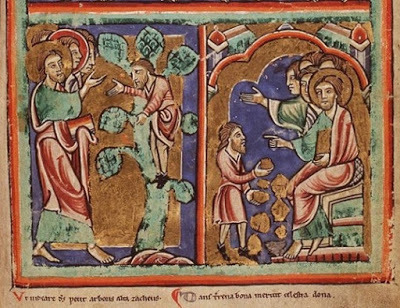 Zacchaeus called down from the Sycamore tree.
Zacchaeus called down from the Sycamore tree.He entered and was passing through Jericho. There was a man named Zacchaeus. He was a chief tax collector, and he was rich. He was trying to see who Jesus was, and couldn't because of the crowd, because he was short. He ran on ahead, and climbed up into a sycamore tree to see him, for he was to pass that way.
When Jesus came to the place, he looked up and saw him, and said to him, "Zacchaeus, hurry and come down, for today I must stay at your house."
He hurried, came down, and received him joyfully.
When they saw it, they all murmured, saying, "He has gone in to lodge with a man who is a sinner."
Zacchaeus stood and said to the Lord, "Behold, Lord, half of my goods I give to the poor. If I have wrongfully exacted anything of anyone, I restore four times as much."
Jesus said to him, "Today, salvation has come to this house, because he also is a son of Abraham. For the Son of Man came to seek and to save that which was lost."
--Luke 19:1-10
Zacchaeus is not a real person. The story of Zacchaeus is a parable. The image of little Zacchaeus climbing a tree is too obviously comic for real life.
Zacchaeus means “pure.” It is not really a name. His small stature makes him seem childlike. He climbs trees, as a child would. And as a self-conscious wealthy man would not. For it is publicly undignified, and likely to expose him to general scorn.
So this is a parable of innocence.
Zacchaeus is egotistic in an innocent way, just as a child is. His initial avarice is innocent, unreflective. Who does not spontaneously want to own nice things? Nice things are nice.
Jesus singles him out from the crowd. Just as Jesus elsewhere says, one must become like a little child to enter the Kingdom of Heaven. “Suffer the little children to come unto me.” Innocence is the key.
But only the key. Jesus opens the door, when he tells Zacchaeus to come down from the tree.
This act of immediate obedience is the test. It equates to repentance. “Get off your high horse.”
Because Zacchaeus does this, wholeheartedly, Jesus comes and dwells with him.
It is surely significant that all this is said to have happened in Jericho: the city that was the entrance to the Promised Land. With such repentance, the walls come tumbling down.
The good man, in sum, is not the man who does not sin. The good man is the man who repents when sin is pointed out. The bad man resists and denies. The difference is the difference between sin and settled vice.
Compare today’s first reading, from the Book of Wisdom: “Yet you are merciful to all, because you are almighty, you overlook people's sins, so that they can repent.” God’s own forgiveness is absolute, but conditional on repentance.
We all sin. We all have avaricious urges. A fundamentally good person, faced with their own wrongdoing, repents and seeks to make amends. A bad person demands “forgiveness” without repentance. That is the difference.
The critical moment in the Garden of Eden was not when Adam and Eve ate the apple. It was when they hid in the bushes, and tried to shift blame.
'Od's Blog: Catholic and Clear Grit comments on the passing parade.
Published on November 03, 2019 06:24



